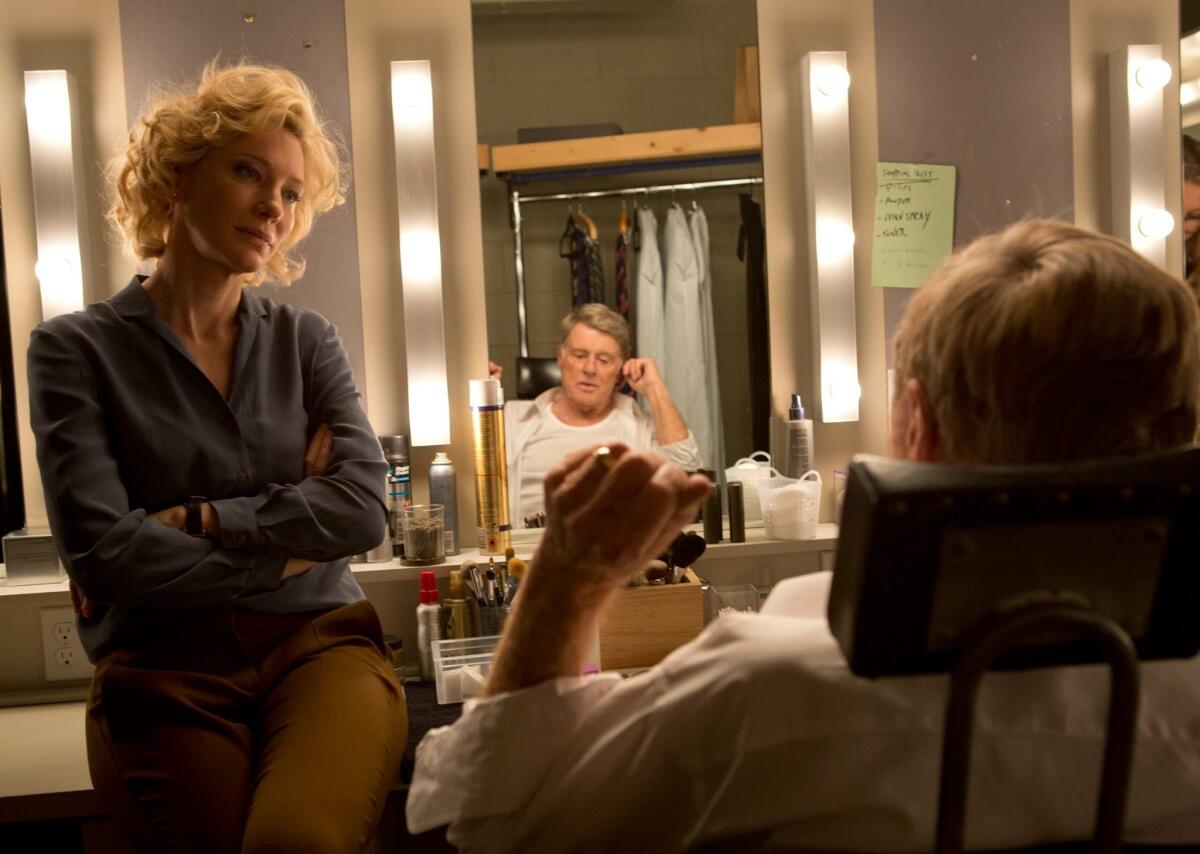Movies ‘Truth’ and ‘Spotlight’ reflect yesteryear journalism with hints at modern-day angst

Cate Blanchett portrays Mary Mapes, left, and Robert Redford portrays Dan Rather in a scene from, “Truth.”
- Share via
Growing up, James Vanderbilt was a news junkie.
The 39-year-old writer-director used to run outside of his Connecticut home in the morning to pick up the newspaper and divvy up the pages with his parents over breakfast. At night, he tuned in to news broadcasts anchored by iconic journalists Dan Rather, Peter Jennings and Tom Brokaw, fascinated and inspired by their storytelling.
“The Fourth Estate is so important, and the backbone of the free society is a free press,” Vanderbilt said. “I believe all the corny stuff, asking questions of powerful people is important. It’s one of the things that keeps our country free. It’s important to tell stories about journalism like this.”
SIGN UP for the free Indie Focus movies newsletter >>
The filmmaker took his admiration for the journalism profession to the big screen with his latest project — and his directorial debut — “Truth.” The film chronicles the events around the 2004 “60 Minutes II” report about then-President George W. Bush’s military service — a report that was later discredited.
The Sony Pictures Classics film, which opened in a limited number of theaters earlier this month, will soon be joined in theaters with another journalism-themed movie, “Spotlight,” this fall. Directed by Tom McCarthy, “Spotlight” examines the Boston Globe’s coverage of the priest abuse scandal in that city.
Hollywood has long had a fascination with newsrooms, from the fictional world of “The Front Page” (and its remake, “His Girl Friday) in the 1930s and ‘40s) to the real-life Watergate tale “All the President’s Men” in the 1970s. But these new movies, both of which take place in the early 2000s, serve as an homage to the old-school journalism that can seem on the brink of extinction in a now-turbulent media landscape.
Across the nation, many newsrooms face layoffs and buyouts, while broadcast TV news networks are struggling to attract younger viewers who prefer to get news from their second screens. Simultaneously, the competition from new media — such as Buzzfeed, Vice Media and Vox.com — has led to a shift in how news is reported.
Back when these films are set, such woes in the journalism industry were only beginning to encroach on newsrooms.
“Truth,” based on former CBS News producer Mary Mapes’ book “Truth and Duty: The Press, The President and the Privilege of Power,” follows the events around the 2004 “60 Minutes II” report about then-President George W. Bush’s military service. The incident got Mapes (played by Cate Blanchett) fired and led to the resignation of Rather (played by Robert Redford).
“Spotlight,” which will launch in theaters on Nov. 6, chronicles the 2003 Pulitzer Prize-winning Boston Globe team’s efforts to uncover abusive priests in the Catholic Church. It features a top-notch cast, including Liev Schreiber, Rachel McAdams, John Slattery, Michael Keaton and Mark Ruffalo.
Fear of layoffs is hinted at in “Spotlight,” most notably in the beginning of the film when Marty Baron (Schreiber) is first brought on as editor of the Globe. After a cake send-off for one staff member, several other Globe reporters begin speculating whether they will be pulled away from investigative work under a new leader. (Ironically there’s a shot toward the beginning that showcases a billboard with the advertisement “AOL Anywhere,” hinting at the future digital-first journalism model.)
In “Truth,” angry conservative bloggers ignited CBS’ investigation of the “60 Minutes II” report that eventually led to the ousting of Mapes and Rather. The network is also depicted in the film as a corporate bad guy, with one scene featuring a producer ranting about CBS’ owner, Viacom.
“I think we have emerged into a culture of half-truths defined by pictures on Instagram, Tweets and breaking news that isn’t thoroughly researched,” said Michael Sugar, a “Spotlight” producer. “We as a people are hungry for the facts. Our hope with this movie, as I’m sure was the same for filmmakers of other journalism movies, was to celebrate the people who actually do the research and do the work to get the truth. I feel like that is what has been lost in our current society.”
For Vanderbilt, the “60 Minutes II” event — dubbed “Rathergate” — marked the death of the “voice of God journalism” he grew up with. Reading Mapes’ book only solidified Vanderbilt’s interest in re-telling the story as a director.
It took a while, but he eventually convinced the former news producer to give him the rights to her story. In an inscribed copy of her book, Mapes wrote to Vanderbilt: “You have my life in your hands.”
“I do think there are cultural shifts that happen, and people then have sort of the same idea that maybe it’s a good time to look at this,” Mapes said of the resurfacing of the journalism movies. “People are noticing missing pieces in our journalistic world now.”
While working on their scripts, both Vanderbilt and McCarthy approached their films like a journalist would an investigation. They interviewed members of the newsrooms to make their stories as accurate as possible.
“It took them a while to open up to us — that’s why we kept going back,” McCarthy said of the Globe staffers. “In a sense, we were investigating their investigation. It was an interesting and fascinating opportunity to re-create something with their assistance.”
Both journalism films have many scenes that show the actors making phone calls (on actual phones, not smartphones), digging through documents or hanging out in the newsroom. In other words, they’re about as far away from special effects-driven movies as you can get.
“We have to gamble artistically,” McCarthy said. “We made a commitment to let the facts play. We said let’s commit to the process — in its thrilling nature, in its mundane nature, in its tedious nature, in its relentless nature. Let’s just commit to that and the process of high-level journalism and, hopefully, because of the subject matter and actual thrust of the investigation, it will be interesting to our audience because it’s the truth.”
ALSO:
‘Spotlight’s’ focus on pedophile priests leads a wave of scandal films at Toronto
Sarah Silverman taps into tumultuous childhood to deliver ‘I Smile Back’
‘Truth’ a plodding retelling of the downfall of CBS News’ Dan Rather
More to Read
Only good movies
Get the Indie Focus newsletter, Mark Olsen's weekly guide to the world of cinema.
You may occasionally receive promotional content from the Los Angeles Times.











